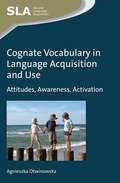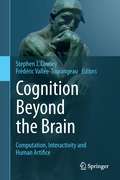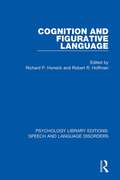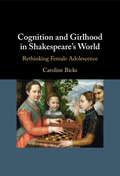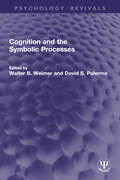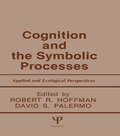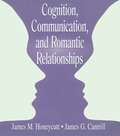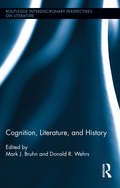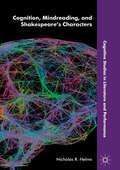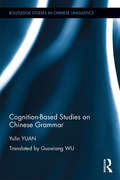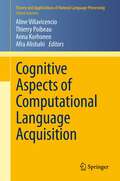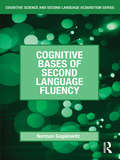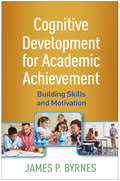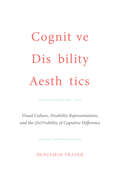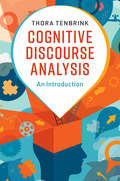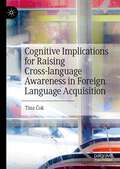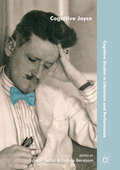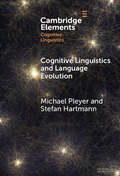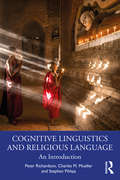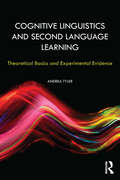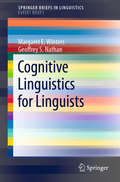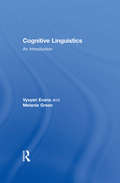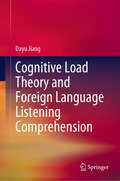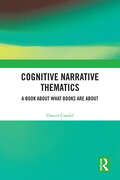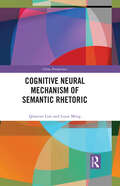- Table View
- List View
Cognate Vocabulary in Language Acquisition and Use
by Agnieszka OtwinowskaThis book brings together linguistic, psycholinguistic and educational perspectives on the phenomenon of cognate vocabulary across languages. It presents a large-scale, long-term research project focusing on Polish-English cognates and their use by bilingual and multilingual learners/users of English. It discusses extensive qualitative and quantitative data to explain which factors affect a learner's awareness of cognates, how adult learners can benefit from raised awareness and whether cognate vocabulary can be used with younger learners as a motivational strategy. The work shows how cognate vocabulary can be examined from a range of methodological perspectives and provides considerable insights into crosslinguistic influences in language learning. While the focus of the studies is Polish-English cognates, the research will be of interest to anyone teaching learners of different language constellations, levels, ages and backgrounds.
Cognition Beyond the Brain: Computation, Interactivity and Human Artifice
by Stephen J. Cowley Frédéric Vallée-TourangeauCognition Beyond the Brain challenges neurocentrism by advocating a systemic view of cognition based on investigating how action shapes the experience of thinking. The systemic view steers between extended functionalism and enactivism by stressing how living beings connect bodies, technologies, language and culture. Since human thinking depends on a cultural ecology, people connect biologically-based powers with extended systems and, by so doing, they constitute cognitive systems that reach across the skin. Biological interpretation exploits extended functional systems. Illustrating distributed cognition, one set of chapters focus on computer mediated trust, work at a construction site, judgement aggregation and crime scene investigation. Turning to how bodies manufacture skills, the remaining chapters focus on interactivity or sense-saturated coordination. The feeling of doing is crucial to solving maths problems, learning about X rays, finding an invoice number, or launching a warhead in a film. People both participate in extended systems and exert individual responsibility. Brains manufacture a now to which selves are anchored: people can act automatically or, at times, vary habits and choose to author actions. In ontogenesis, a systemic view permits rationality to be seen as gaining mastery over world-side resources. Much evidence and argument thus speaks for reconnecting the study of computation, interactivity and human artifice. Taken together, this can drive a networks revolution that gives due cognitive importance to the perceivable world that lies beyond the brain. Cognition Beyond the Brain is a valuable reference for researchers, practitioners and graduate students within the fields of Computer Science, Psychology, Linguistics and Cognitive Science.
Cognition and Figurative Language (Psychology Library Editions: Speech and Language Disorders)
by Robert R. Hoffman Richard P. HoneckOriginally published in 1980, this is a book about the psychology of figurative language. It is however, eclectic and therefore should be of interest to professionals and students in education, linguistics, philosophy, sociolinguistics, and other concerned with meaning and cognition. The editors felt there was a pressing need to bring together the growing empirical efforts of this topic. In a sense, recognition of the theoretical importance of figurative language symbolized the transition from the psycholinguistics of the 1960s to that of the late 1970s, that is from a linguistic semantics to a more comprehensive psychological semantics with a healthy respect for context, inference, world knowledge, and above all creative imagination. The organization of the volume reflects the more basic, general concerns with cognition – from historical and philosophical background, through problems of mental representation and semantic theory, to developmental trends, and to applications in problem solving.
Cognition and Girlhood in Shakespeare's World: Rethinking Female Adolescence
by Caroline BicksThis groundbreaking study of girlhood and cognition argues that early moderns depicted female puberty as a transformative event that activated girls' brains in dynamic ways. Mining a variety of genres from Shakespearean plays and medical texts to autobiographical writings, Caroline Bicks shows how 'the change of fourteen years' seemed to gift girls with the ability to invent, judge, and remember what others could or would not. Bicks challenges the presumption that early moderns viewed all female cognition as passive or pathological, demonstrating instead that girls' changing adolescent brains were lightning rods for some of the period's most vital debates about the body and soul, faith and salvation, science and nature, and the place and agency of human perception in the midst of it all.
Cognition and the Symbolic Processes (Psychology Revivals)
by David S. Palermo Walter B. WeimerOriginally published in 1974 and taking the revolution in psycholinguistics and cognitive psychology as a point of departure, this book summarizes the lessons learned from past attempts to construct a psychology of the higher mental processes. Even more importantly, it crystallizes specific directives and research proposals that show where cognitive psychology ought to go in the future. The relationship of learning theory, linguistics, and perception to the broad field of cognition and the nature of mind and knowledge are examined in detail. Today it can be read in its historical context.
Cognition and the Symbolic Processes: Applied and Ecological Perspectives
by Robert R. Hoffman David S. PalermoThis volume is a festschrift dedicated to James J. Jenkins, a pioneer in many areas of experimental psychology. It has three major goals: to provide a forum for debate on current theoretical issues in cognitive psychology, to capture the "state of the art" in reviews of research methods and results, and to generate ideas for new research directions and methodologies. Contributors -- including Jenkins' former students and present colleagues -- ponder fundamental questions such as: * How do people learn to read? * What happens during the processes of speech perception? * How do people acquire problem solving skills? * How do cognitive and motor skills develop and integrate with one another? Many chapters focus specifically on ecological and applied cognitive psychology. Specific topics covered include visual and speech perception, language, memory, motivation, child development, problem solving, and pedagogy.
Cognition, Communication, and Romantic Relationships (LEA's Series on Personal Relationships)
by James M. Honeycutt James G. CantrillCognition, Communication, and Romantic Relationships focuses on the role of memory, communication, and social cognition in the development of romantic relationships. The authors review developmental models of communication and examine criticisms of these models. They also explore the stages through which relationships escalate and deteriorate, and consider the processes for such activities as meeting new people, dating, sexual intercourse, and terminating relationships. Differences between men and women are discussed throughout the text, in light of current research supporting systematic gender differences in how people think about romance and relationships. As an extended analysis and research review of how thinking about romance influences and is influenced by communicative processes, this text offers a deeper understanding of the cognitive and communicative factors involved in relationship processes. It is designed for use in courses on interpersonal relationships and intimate relations in social psychology, communication, counseling psychology, clinical psychology, and sociology.
Cognition, Literature, and History (Routledge Interdisciplinary Perspectives on Literature)
by Donald R. Wehrs Mark J. BruhnCognition, Literature, and History models the ways in which cognitive and literary studies may collaborate and thereby mutually advance. It shows how understanding of underlying structures of mind can productively inform literary analysis and historical inquiry, and how formal and historical analysis of distinctive literary works can reciprocally enrich our understanding of those underlying structures. Applying the cognitive neuroscience of categorization, emotion, figurative thinking, narrativity, self-awareness, theory of mind, and wayfinding to the study of literary works and genres from diverse historical periods and cultures, the authors argue that literary experience proceeds from, qualitatively heightens, and selectively informs and even reforms our evolved and embodied capacities for thought and feeling. This volume investigates and locates the complex intersections of cognition, literature, and history in order to advance interdisciplinary discussion and research in poetics, literary history, and cognitive science.
Cognition, Mindreading, and Shakespeare’s Characters (Cognitive Studies In Literature And Performance Ser.)
by Nicholas R. HelmsCognition, Mindreading, and Shakespeare's Characters brings cognitive science to Shakespeare, applying contemporary theories of mindreading to Shakespeare’s construction of character. Building on the work of the philosopher Alvin Goldman and cognitive literary critics such as Bruce McConachie and Lisa Zunshine, Nicholas Helms uses the language of mindreading to analyze inference and imagination throughout Shakespeare’s plays, dwelling at length on misread minds in King Lear, Much Ado About Nothing, Othello, and Romeo and Juliet. Shakespeare manipulates the mechanics of misreading to cultivate an early modern audience of adept mindreaders, an audience that continues to contemplate the moral ramifications of Shakespeare’s characters even after leaving the playhouse. Using this cognitive literary approach, Helms reveals how misreading fuels Shakespeare’s enduring popular appeal and investigates the ways in which Shakespeare’s characters can both corroborate and challenge contemporary cognitive theories of the human mind.
Cognition-Based Studies on Chinese Grammar (Routledge Studies in Chinese Linguistics)
by Yulin YuanIntroducing the English translations of 8 selected research articles originally written in Chinese by Professor Yuan Yulin, Cognition-based Studies on Chinese Grammar is an essential reading for researchers in Chinese syntax. Yuan Yulin is one of the very first Chinese scholars who introduced cognitive sciences into the study of Chinese language some twenty years ago, and his work is well-known and highly regarded in China for its originality and theoretical contribution. The collection covers the core of his engagement with Chinese language studies, ranging from lexical exploration to grammatical discussion. Cognition-based Studies on Chinese Grammar is designed for students or researchers who specialize in the Chinese language, contemporary Chinese grammar and cognitive linguistics. It can also serve as a reference book for instructors or teachers engaged in Chinese language pedagogy or in teaching Chinese as a second or foreign language.
Cognitive Aspects of Computational Language Acquisition (Theory and Applications of Natural Language Processing)
by Aline Villavicencio Anna Korhonen Thierry Poibeau Afra AlishahiQuestions related to language acquisition have been of interest for many centuries, as children seem to acquire a sophisticated capacity for processing language with apparent ease, in the face of ambiguity, noise and uncertainty. However, with recent advances in technology and cognitive-related research it is now possible to conduct large-scale computational investigations of these issues The book discusses some of the latest theoretical and practical developments in the areas involved, including computational models for language tasks, tools and resources that help to approximate the linguistic environment available to children during acquisition, and discussions of challenging aspects of language that children have to master. This is a much-needed collection that provides a cross-section of recent multidisciplinary research on the computational modeling of language acquisition. It is targeted at anyone interested in the relevance of computational techniques for understanding language acquisition. Readers of this book will be introduced to some of the latest approaches to these tasks including: * Models of acquisition of various types of linguistic information (from words to syntax and semantics) and their relevance to research on human language acquisition * Analysis of linguistic and contextual factors that influence acquisition * Resources and tools for investigating these tasks Each chapter is presented in a self-contained manner, providing a detailed description of the relevant aspects related to research on language acquisition, and includes illustrations and tables to complement these in-depth discussions. Though there are no formal prerequisites, some familiarity with the basic concepts of human and computational language acquisition is beneficial.
Cognitive Bases of Second Language Fluency (Cognitive Science and Second Language Acquisition Series)
by Norman SegalowitzWinner of the 2011 Kenneth W. Mildenberger Prize Exploring fluency from multiple vantage points that together constitute a cognitive science perspective, this book examines research in second language acquisition and bilingualism that points to promising avenues for understanding and promoting second language fluency. Cognitive Bases of Second Language Fluency covers essential topics such as units of analysis for measuring fluency, the relation of second language fluency to general cognitive fluidity, social and motivational contributors to fluency, and neural correlates of fluency. The author provides clear and accessible summaries of foundational empirical work on speech production, automaticity, lexical access, and other issues of relevance to second language acquisition theory. Cognitive Bases of Second Language Fluency is a valuable reference for scholars in SLA, cognitive psychology, and language teaching, and it can also serve as an ideal textbook for advanced courses in these fields.
Cognitive Development for Academic Achievement: Building Skills and Motivation
by James P. ByrnesThis integrative text spotlights what educators need to know about children's cognitive development across grade levels (PreK-12) and content areas. The book provides a concise introduction to developmental neuroscience and theories of learning. Chapters on general cognitive abilities probe such crucial questions as what children are capable of remembering at different ages, what explains differences in effort and persistence, and how intelligence and aptitudes relate to learning. Domain-specific chapters focus on the development of key academic skills in reading, writing, math, science, and history. Multiple influences on academic achievement and motivation are explored, including school, family, cultural, and socioeconomic factors. Each chapter concludes with clear implications for curriculum and instruction.
Cognitive Disability Aesthetics: Visual Culture, Disability Representations, and the (In)Visibility of Cognitive Difference (Toronto Iberic)
by Benjamin FraserCognitive Disability Aesthetics explores the invisibility of cognitive disability in theoretical, historical, social, and cultural contexts. Benjamin Fraser’s cutting edge research and analysis signals a second-wave in disability studies that prioritizes cognition. Fraser expands upon previous research into physical disability representations and focuses on those disabilities that tend to be least visible in society (autism, Down syndrome, Alzheimer's disease, schizophrenia). Moving beyond established literary approaches analyzing prose representations of disability, the book explores how iconic and indexical modes of signification operate in visual texts. Taking on cognitive disability representations in a range of visual media (painting, cinema, and graphic novels), Fraser showcases the value of returning to impairment discourse. Cognitive Disability Aesthetics successfully reconfigures disability studies in the humanities and exposes the chasm that exists between Anglophone disability studies and disability studies in the Hispanic world.
Cognitive Discourse Analysis: An Introduction
by Thora TenbrinkAnalysing language data systematically and looking closely at how people formulate their thoughts can reveal astonishing insights about the human mind. Without presupposing specific subject knowledge, this book gently introduces its readers to theoretical insights as well as practical principles for systematic linguistic analysis from a cognitive perspective. Drawing on Thora Tenbrink's twenty years' experience in both linguistics and cognitive science, this book offers theoretical guidance and practical advice for doing cognitive discourse analysis. It covers areas of analysis as diverse as attention, perspective, granularity, certainty, inference, transformation, communication, and cognitive strategies, using inspiring examples from many different projects. Simple techniques and tools are used to allow readers new to the subject easy ways to apply the methods, without the need for complex technologies, whilst the cross-disciplinary approach can be applied to a diverse range of research purposes and contexts in which language and thought play a role.
Cognitive Implications for Raising Cross-language Awareness in Foreign Language Acquisition
by Tina ČokThis book focuses on the role of cross-language awareness in foreign language learning, especially unrelated languages as a third or additional language. It brings together theoretical and empirical approaches to the study of foreign language acquisition, with special emphasis on the role of discrepancies in the cognitive processing of typologically different languages. The author defines unrelated languages in the context of methodological approaches to foreign language acquisition, investigates cross-language awareness competence in the context of unrelated language acquisition, establishes cognitive approaches to foreign language acquisition, and provides empirical evidence of discrepancies between languages using verbal aspect as an example. Finally, the empirical results are put into practice through guidelines and recommendations for raising cross-language awareness in third language acquisition. The interdisciplinary understanding of foreign language acquisition presented in this book will make it appealing to a wide readership of graduate students, faculty members and academic researchers in the fields of Second Language Acquisition (SLA), Third Language Acquisition (TLA), Psycholinguistics, Cognitive Psychology and Education.
Cognitive Joyce (Cognitive Studies In Literature And Performance Ser.)
by Sylvain Belluc Valérie BénéjamThis collection is the first book-length study to re-evaluate all of James Joyce's major fictional works through the lens of cognitive studies. Cognitive Joyce presents Joyce's relationship to the scientific knowledge and practices of his time and examines his texts in light of contemporary developments in cognitive and neuro-sciences. The chapters pursue a threefold investigation—into the author's "extended mind" at work, into his characters' complex and at times pathological perceptive and mental processes, and into the elaborate responses the work elicits as we perform the act of reading. This volume not only offers comprehensive overviews of the oeuvre, but also detailed close-readings that unveil the linguistic focus of Joyce's drama of cognition.
Cognitive Linguistics and Language Evolution (Elements in Cognitive Linguistics)
by Michael Pleyer Stefan HartmannThe evolution of language has developed into a large research field. Two questions are particularly relevant for this strand of research: firstly, how did the human capacity for language emerge? And secondly, which processes of cultural evolution are involved both in the evolution of human language from non-linguistic communication and in the continued evolution of human languages? Much research on language evolution that addresses these two questions is highly compatible with the usage-based approach to language pursued in cognitive linguistics. Focusing on key topics such as comparing human language and animal communication, experimental approaches to language evolution, and evolutionary dynamics in language, this Element gives an overview of the current state-of-the-art of language evolution research and discusses how cognitive linguistics and research on the evolution of language can cross-fertilise each other. This title is also available as Open Access on Cambridge Core.
Cognitive Linguistics and Religious Language: An Introduction
by Peter Richardson Stephen Pihlaja Charles M. MuellerThis book comprehensively introduces Cognitive Liguistics and applies its tools to religious language. Drawing on authentic samples from a range of faiths, text types, and modes of interactive discourse, the authors accessibly define concepts like embodied cognition, agency, metaphor analysis, and Dynamic Systems Theory; illustrate how they can be used in analyzing religious language; and offer thorough pedagogical material to aid learning and application. Advanced students and scholars of linguistics, discourse analysis, cognitive science, and religious and biblical studies will benefit from this practical guide to understanding and conducting research on religious discourse.
Cognitive Linguistics and Second Language Learning: Theoretical Basics and Experimental Evidence (Second Language Acquisition Research Series)
by Andrea TylerThis book illustrates the ways that cognitive linguistics, a relatively new paradigm in language studies, can illuminate and facilitate language research and teaching. The first part of the book introduces the basics of cognitive linguistic theory in a way that is geared toward second language teachers and researchers. The second part of the book provides experimental evidence of the usefulness of applying cognitive linguistics to the teaching of English. Included is a thorough review of the existing literature on cognitive linguistic applications to teaching and cognitive linguistic-based experiments. Three chapters report original experiments which focus on teaching modals, prepositions and syntactic constructions, elements of English that learners tend to find challenging. A chapter on “future directions” reports on an innovative analysis of English conditionals. Pedagogical aids such as diagrams and sample exercises round out this pioneering and innovative text.
Cognitive Linguistics for Linguists (SpringerBriefs in Linguistics)
by Margaret E. Winters Geoffrey S. NathanThis volume offers an introduction to cognitive linguistics, written by authors who were engaged in the field from its beginnings. It starts by reviewing these early studies and provides an overview of the sources and conceptual underpinnings of the theory. This is followed by a description of how cognitive linguistics has been (and continues to be) applied in all subcomponents of language study. From the point of view of the history of Linguistics, it presents the evolution of the theory over time in a range of directions, including its view of the nature of Language itself, as well as how it is acquired. The final chapter provides an overview of relatively new approaches, in particular those which are provoking a significant challenge to the generative account.
Cognitive Linguistics: An Introduction
by Vyvyan Evans Melanie GreenA general introduction to the area of theoretical linguistics known as cognitive linguistics, this textbook provides up-to-date coverage of all areas of the field, including recent developments within cognitive semantics (such as Primary Metaphor Theory, Conceptual Blending Theory, and Principled Polysemy), and cognitive approaches to grammar (such as Radical Construction Grammar and Embodied Construction Grammar). The authors offer clear, critical evaluations of competing formal approaches within theoretical linguistics. For example, cognitive linguistics is compared to Generative Grammar and Relevance Theory. In the selection of material and in the presentations, the authors have aimed for a balanced perspective.Part II, Cognitive Semantics, and Part III, Cognitive Approaches to Grammar, have been created to be read independently. The authors have kept in mind that different instructors and readers will need to use the book in different ways tailored to their own goals. The coverage is suitable for a number of courses.While all topics are presented in terms accessible to both undergraduate and graduate students of linguistics, cognitive linguistics, psycholinguistics, cognitive science, and modern languages, this work is sufficiently comprehensive and detailed to serve as a reference work for scholars who wish to gain a better understanding of cognitive linguistics.
Cognitive Load Theory and Foreign Language Listening Comprehension
by Dayu JiangThis book presents an interdisciplinary approach to understanding the learning and listening skills of a foreign language from the perspectives of cognitive load theory and second language acquisition theories. It explores when and how foreign language listening skills could be curiously improved more effectively by reading than by listening. The results of randomized controlled experiments in the book demonstrate an expertise reversal effect, which calls teachers to adjust instructional approaches to accommodate learners’ expertise level. The book expands the existing language comprehension frameworks by including working memory load as a crucial factor in written or verbal information processing. It also develops cognitive load theory by applying it in a less well-structured subject area—foreign language learning.The book is of interest to postgraduate teachers and learners of a foreign language, instructional designers, educational policy makers, and academic researchers in the fields of learning sciences, curriculum and pedagogy, educational psychology, cognitive load theory, second language acquisition, and foreign language teaching and learning.
Cognitive Narrative Thematics: A Book About What Books Are About
by Daniel CandelCognitive Narratives Thematics proposes a new way in which narrative works organise their thematic material. It rehabilitates the study of what books are about by providing a cognitive narrative thematic model (CNT). Part I presents CNT by combining different approaches to narrative, such as evolutionary theory, semiotics, possible worlds theory, or rhetorical criticism. Part II applies CNT to a variety of well-known narratives in different modalities, such as Robert Browning’s "My Last Duchess", Julia Donaldson’s The Gruffalo, Maurice Sendak’s Where the Wild Things Are, Frank Miller’s 300, or Mike Mignola’s Hellboy. It also considers literary histories and digital humanities. Daniel Candel shows that CNT deserves greater attention and that thematics generates its own forms and adds to the aesthetic pleasure of the text. Candel illustrates that CNT improves the established interpretations of the narrative works it studies. This innovative study reveals how CNT offers readers a deeper understanding, and how readers and critics are often using CNT intuitively without being aware of it. It is an invaluable resource for students and scholars of narrative theory.
Cognitive Neural Mechanism of Semantic Rhetoric (China Perspectives)
by Qiaoyun Liao Lijun MengThis book is a necessary supplement to the theoretical exploration into semantic rhetoric, particularly a breakthrough in the study of the relationship between the source domain and target domain involved in the construction of semantic rhetorical discourse.The study focuses on rhetorical expressions constructed by means of semantic variation or deviation of concepts. Based on the holistic cognitive pragmatic model and the framework of impartment and inheritance of connotation and denotation, this book constructs a new framework, the Annotation-Denotation Relevance-Inheritance Model (ADRIM) to explain the construing of semantic rhetoric. Besides, rooted in the Index Hypothesis Theory and the research paradigm of affordance derivation in language comprehension, three ERP experiments on metaphor, irony, and pun, are conducted to demonstrate the psychological reality that people activate possible feature extraction in the process of understanding semantic rhetoric. With those sample analyses and experiments, the feasibility and operability of ADRIM are proved. The book unfolds a combined approach of speculative research and empirical research, and can provide a new methodological alternative for semantic rhetorical studies in different languages.This title will be an essential read to students and scholars of Linguistics, East Asian Studies, and social workers who are interested in Language Studies in general.
